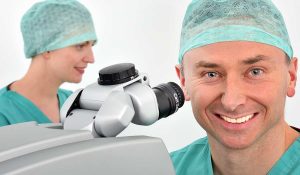Future goals for cataract surgery – where will cataract surgery be in 50 years time?
Welcome to the final instalment in our three-part blog by Consultant Ophthalmologist, Mr Jonathan Ross. In the article, Jonathan predicts the innovations that are likely to come about in cataract surgery over the next half century.
As cataract surgery gets better and safer, more attention will turn to having surgery at an early stage, and expectations of having good vision without spectacles will increase. Several multinational organisations are also investing large sums of money into lens development with functionality beyond good optics. Here’s my list of innovations we can expect during my lifetime.
- Serious eye infections will be almost eliminated. Further reductions of incision size, new refinements to sterile technique, closer postoperative scrutiny and a better understanding of the process of toxic and inflammatory damage during infection will lead to serious infections occurring in only one in every tens of thousands of cases. This might mean that most eye surgeons never see a serious eye infection in their career.
- Further research will make lens power calculations more and more accurate so that freedom from spectacles becomes the normal expectation after surgery.
- Technology firms will develop safe methods for remotely charging power cells inside lens implants so that they can incorporate energy-using functions.
- Further technology developments will lead to development of lens implants which can stream media as well as give good vision. So for example, you might be able to activate your lens implants with a voice command to superimpose satellite navigation information onto the world in front of you, a little bit like the heads-up display on a car windscreen.
- Diabetic monitoring. The clear fluid inside your eye can be used to monitor blood sugar levels. Scientists are developing sensors which could fit onto lens implants and provide very accurate information on diabetic sugar control.
- In a similar way, sensors on lens implants could be used to monitor pressure inside the eye and help manage glaucoma before any damage is done to vision.
- A combination of the above changes will lead to lens surgery becoming a common lifestyle choice for young adults.
Find out more about about cataract surgery
Read part one of the ‘All you need to know about cataract surgery’
Read part two of the ‘All you need to know about cataract surgery’


